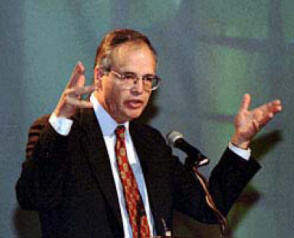Class News
Gus Speth '64 on Yale's strategy for greenhouse gas reduction
Gus Speth, our classmate and dean of Yale's School of Forestry and Environmental Studies, reflects below on Yale's recent announcement of a leadership role in greenhouse gas reduction.
First, Gus's comments. Then, the Yale announcement which prompted them ...
Dear Friends:
In my six-plus years as dean of Yale F&ES, I don't think I have had a
happier or prouder moment than when I first read the announcement below
from President Rick Levin. You can safely pass over Rick's references to
me, and get to the heart of the matter, which is his announcement of a
new 15-year strategic energy policy for the university, including ― and
most exciting of all ― a commitment by Yale to reduce its greenhouse gas
emissions by 10% below its 1990 levels by the year 2020.

Many
individuals at our school have been vocal and persistent proponents of
Yale University becoming a genuine leader in sustainable energy
practice ― and this wonderful new development is a tribute to their
efforts. But the victory belongs to all of Yale, and in addition to the
many students and faculty from all parts of the university who supported
and worked for a 'greener Yale', we salute in particular Provost Andy
Hamilton, Vice President John Pepper, Sustainability Director Julie
Newman, and of course President Levin himself. Without their judgment
that a new Yale energy policy is not only the right thing but
financially the wise thing to do, we would not be celebrating this best
of all possible news.
Yale University has made great strides as an environmental leader, but
this may well be our finest hour. I hope you are as pleased and
heartened by it as I am.
Sincerely,
Gus Speth
Letter of Oct. 11, 2005, to the Yale Community from President Rick Levin, Provost Andrew Hamilton, and John Pepper, VP for Finance & Administration
Subject: Greenhouse Gas Reduction Strategy

In his recent
book, Red Sky at Morning, Gus Speth, Dean of Yale's School of
Forestry and Environmental Studies, states that in the face of
disturbing polar ice loss and the startling consequences of global
warming "addressing CO2 emissions from fossil fuels must be the bedrock
of [a successful climate strategy]." This concern has been strongly
reinforced by the Advisory Committee on Environmental Management, under
the leadership of Professor Thomas Graedel, and by a number of student
groups around the university. Yale recognizes the need to respond to and
prepare for the unprecedented circumstances that we face with respect to
energy production, consumption, and related carbon emissions. As an
institution, Yale is committed to becoming a model university that
prepares its students for facing the pressing environmental conditions
and taking a leadership role amongst higher education institutions to
respond to the energy challenge.
In the fall of 2004 the Yale Energy Task Force, a university-wide
committee with staff, faculty and student representation, was convened
to respond to the challenge of increasing energy costs and greenhouse
gas emissions. The task force was charged with making recommendations on Yale's approach to energy-production (from conventional to renewable), procurement, demand,
greenhouse gas emission reduction and conservation.
Following a thorough review and analysis, the Officers have adopted the
key recommendation from the report presented by the Energy Task Force.
We are pleased to announce the following campus wide goal which will
become effective immediately:
Yale is committed to a level of investment in energy conservation and
alternate energy sources that will lead, based on current projections,
to a reduction in its greenhouse gas emissions by 10% below our 1990
levels by the year 2020. This is consistent with a similar commitment by
the Connecticut State Legislature and the New England Governor's and
Eastern Canadian Premiers Climate Action Plan.
By adopting this goal Yale is one of the first universities in the
country to commit to a fifteen-year strategic energy plan. We intend to
reach our goal through a combination of a strong energy conservation
program, investing in alternative energy sources, purchasing Renewable
Energy Certificates, and implementing on-site renewable and clean energy
demonstration projects.
Every one of us on campus has a role to play in helping achieve this
goal, by conserving energy and by reducing the greenhouse gas emissions
that flow from its use. Effective conservation programs can further free
up funds within the University budget that will in turn be invested in
renewable and non-CO2 emitting forms of energy. Specifically, we are
setting out to achieve the following conservation targets:
- 15% reduction at residential colleges over a three-year period
- 10% reduction at all other facilities
Two student groups, New Haven Action and the Student Task Force for
Environmental Partnership, will take the lead in engaging and educating
students on how to participate in advancing our goals for energy
conservation. For every 5% of reduction at residential colleges the
University will allocate renewable energy certificates to offset 1/3rd
of the electrical energy used by residential colleges.
There will be a great deal of learning to be gained, both here at Yale
and outside the campus community, on how to best meet our energy
conservation and greenhouse gas reduction goals. We will share this
learning internally and externally as it is gained in the months and
years ahead.
To learn more about Yale's fifteen-year Greenhouse Gas Reduction and
Renewable Energy strategic plan go to
http://www.yale.edu/sustainability.
Sincerely,
Richard C. Levin, President
Andrew D. Hamilton, Provost
John E. Pepper, Vice President for Finance and Administration

